Yue Guo
EHR-RAG: Bridging Long-Horizon Structured Electronic Health Records and Large Language Models via Enhanced Retrieval-Augmented Generation
Jan 29, 2026Abstract:Electronic Health Records (EHRs) provide rich longitudinal clinical evidence that is central to medical decision-making, motivating the use of retrieval-augmented generation (RAG) to ground large language model (LLM) predictions. However, long-horizon EHRs often exceed LLM context limits, and existing approaches commonly rely on truncation or vanilla retrieval strategies that discard clinically relevant events and temporal dependencies. To address these challenges, we propose EHR-RAG, a retrieval-augmented framework designed for accurate interpretation of long-horizon structured EHR data. EHR-RAG introduces three components tailored to longitudinal clinical prediction tasks: Event- and Time-Aware Hybrid EHR Retrieval to preserve clinical structure and temporal dynamics, Adaptive Iterative Retrieval to progressively refine queries in order to expand broad evidence coverage, and Dual-Path Evidence Retrieval and Reasoning to jointly retrieves and reasons over both factual and counterfactual evidence. Experiments across four long-horizon EHR prediction tasks show that EHR-RAG consistently outperforms the strongest LLM-based baselines, achieving an average Macro-F1 improvement of 10.76%. Overall, our work highlights the potential of retrieval-augmented LLMs to advance clinical prediction on structured EHR data in practice.
Dr. Assistant: Enhancing Clinical Diagnostic Inquiry via Structured Diagnostic Reasoning Data and Reinforcement Learning
Jan 20, 2026Abstract:Clinical Decision Support Systems (CDSSs) provide reasoning and inquiry guidance for physicians, yet they face notable challenges, including high maintenance costs and low generalization capability. Recently, Large Language Models (LLMs) have been widely adopted in healthcare due to their extensive knowledge reserves, retrieval, and communication capabilities. While LLMs show promise and excel at medical benchmarks, their diagnostic reasoning and inquiry skills are constrained. To mitigate this issue, we propose (1) Clinical Diagnostic Reasoning Data (CDRD) structure to capture abstract clinical reasoning logic, and a pipeline for its construction, and (2) the Dr. Assistant, a clinical diagnostic model equipped with clinical reasoning and inquiry skills. Its training involves a two-stage process: SFT, followed by RL with a tailored reward function. We also introduce a benchmark to evaluate both diagnostic reasoning and inquiry. Our experiments demonstrate that the Dr. Assistant outperforms open-source models and achieves competitive performance to closed-source models, providing an effective solution for clinical diagnostic inquiry guidance.
Interleaving Reasoning for Better Text-to-Image Generation
Sep 09, 2025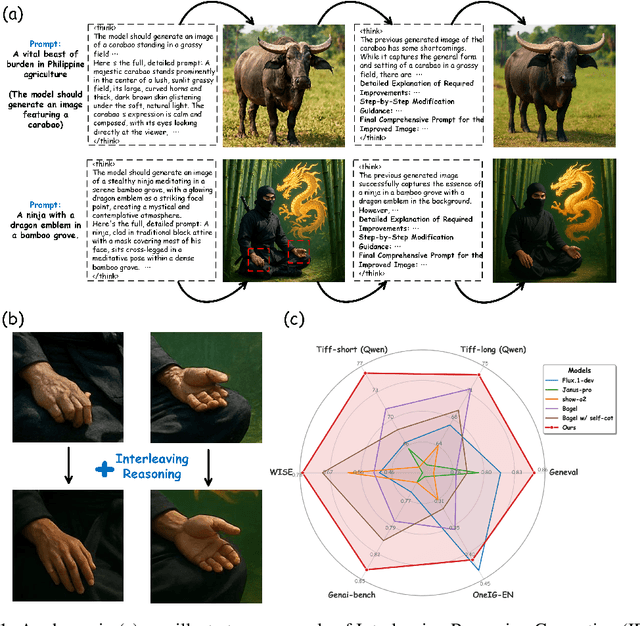
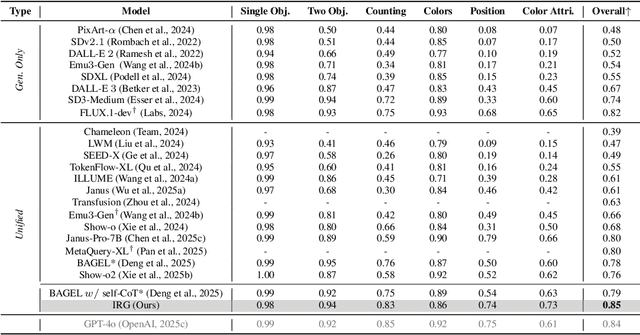

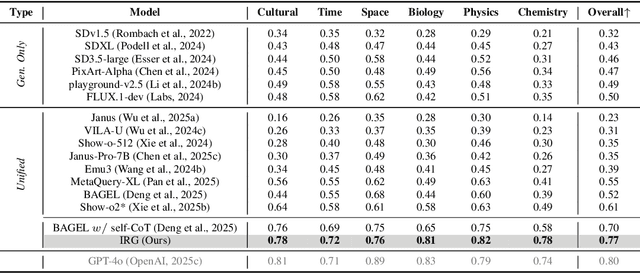
Abstract:Unified multimodal understanding and generation models recently have achieve significant improvement in image generation capability, yet a large gap remains in instruction following and detail preservation compared to systems that tightly couple comprehension with generation such as GPT-4o. Motivated by recent advances in interleaving reasoning, we explore whether such reasoning can further improve Text-to-Image (T2I) generation. We introduce Interleaving Reasoning Generation (IRG), a framework that alternates between text-based thinking and image synthesis: the model first produces a text-based thinking to guide an initial image, then reflects on the result to refine fine-grained details, visual quality, and aesthetics while preserving semantics. To train IRG effectively, we propose Interleaving Reasoning Generation Learning (IRGL), which targets two sub-goals: (1) strengthening the initial think-and-generate stage to establish core content and base quality, and (2) enabling high-quality textual reflection and faithful implementation of those refinements in a subsequent image. We curate IRGL-300K, a dataset organized into six decomposed learning modes that jointly cover learning text-based thinking, and full thinking-image trajectories. Starting from a unified foundation model that natively emits interleaved text-image outputs, our two-stage training first builds robust thinking and reflection, then efficiently tunes the IRG pipeline in the full thinking-image trajectory data. Extensive experiments show SoTA performance, yielding absolute gains of 5-10 points on GenEval, WISE, TIIF, GenAI-Bench, and OneIG-EN, alongside substantial improvements in visual quality and fine-grained fidelity. The code, model weights and datasets will be released in: https://github.com/Osilly/Interleaving-Reasoning-Generation .
Advancing Multimodal Reasoning: From Optimized Cold Start to Staged Reinforcement Learning
Jun 04, 2025



Abstract:Inspired by the remarkable reasoning capabilities of Deepseek-R1 in complex textual tasks, many works attempt to incentivize similar capabilities in Multimodal Large Language Models (MLLMs) by directly applying reinforcement learning (RL). However, they still struggle to activate complex reasoning. In this paper, rather than examining multimodal RL in isolation, we delve into current training pipelines and identify three crucial phenomena: 1) Effective cold start initialization is critical for enhancing MLLM reasoning. Intriguingly, we find that initializing with carefully selected text data alone can lead to performance surpassing many recent multimodal reasoning models, even before multimodal RL. 2) Standard GRPO applied to multimodal RL suffers from gradient stagnation, which degrades training stability and performance. 3) Subsequent text-only RL training, following the multimodal RL phase, further enhances multimodal reasoning. This staged training approach effectively balances perceptual grounding and cognitive reasoning development. By incorporating the above insights and addressing multimodal RL issues, we introduce ReVisual-R1, achieving a new state-of-the-art among open-source 7B MLLMs on challenging benchmarks including MathVerse, MathVision, WeMath, LogicVista, DynaMath, and challenging AIME2024 and AIME2025.
Explain Less, Understand More: Jargon Detection via Personalized Parameter-Efficient Fine-tuning
May 22, 2025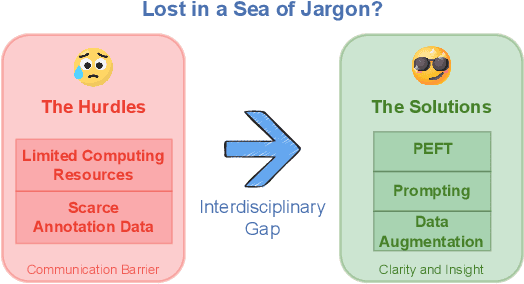
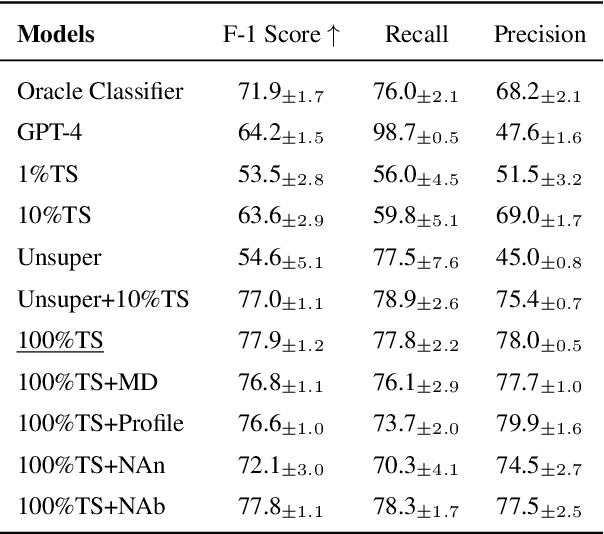
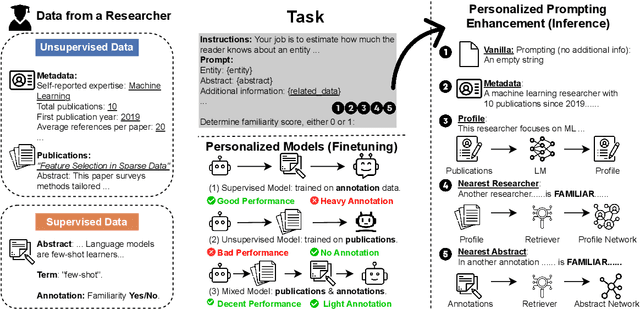
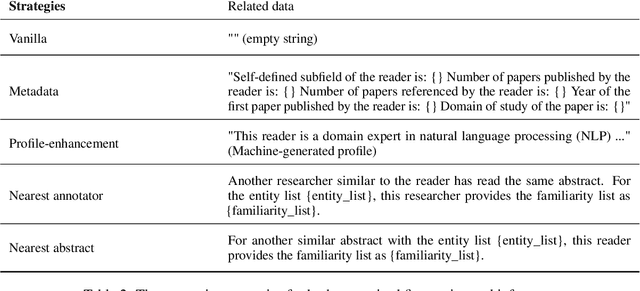
Abstract:Personalizing jargon detection and explanation is essential for making technical documents accessible to readers with diverse disciplinary backgrounds. However, tailoring models to individual users typically requires substantial annotation efforts and computational resources due to user-specific finetuning. To address this, we present a systematic study of personalized jargon detection, focusing on methods that are both efficient and scalable for real-world deployment. We explore two personalization strategies: (1) lightweight fine-tuning using Low-Rank Adaptation (LoRA) on open-source models, and (2) personalized prompting, which tailors model behavior at inference time without retaining. To reflect realistic constraints, we also investigate hybrid approaches that combine limited annotated data with unsupervised user background signals. Our personalized LoRA model outperforms GPT-4 by 21.4% in F1 score and exceeds the best performing oracle baseline by 8.3%. Remarkably, our method achieves comparable performance using only 10% of the annotated training data, demonstrating its practicality for resource-constrained settings. Our study offers the first work to systematically explore efficient, low-resource personalization of jargon detection using open-source language models, offering a practical path toward scalable, user-adaptive NLP system.
Are LLM-generated plain language summaries truly understandable? A large-scale crowdsourced evaluation
May 15, 2025Abstract:Plain language summaries (PLSs) are essential for facilitating effective communication between clinicians and patients by making complex medical information easier for laypeople to understand and act upon. Large language models (LLMs) have recently shown promise in automating PLS generation, but their effectiveness in supporting health information comprehension remains unclear. Prior evaluations have generally relied on automated scores that do not measure understandability directly, or subjective Likert-scale ratings from convenience samples with limited generalizability. To address these gaps, we conducted a large-scale crowdsourced evaluation of LLM-generated PLSs using Amazon Mechanical Turk with 150 participants. We assessed PLS quality through subjective Likert-scale ratings focusing on simplicity, informativeness, coherence, and faithfulness; and objective multiple-choice comprehension and recall measures of reader understanding. Additionally, we examined the alignment between 10 automated evaluation metrics and human judgments. Our findings indicate that while LLMs can generate PLSs that appear indistinguishable from human-written ones in subjective evaluations, human-written PLSs lead to significantly better comprehension. Furthermore, automated evaluation metrics fail to reflect human judgment, calling into question their suitability for evaluating PLSs. This is the first study to systematically evaluate LLM-generated PLSs based on both reader preferences and comprehension outcomes. Our findings highlight the need for evaluation frameworks that move beyond surface-level quality and for generation methods that explicitly optimize for layperson comprehension.
Model-Agnostic Policy Explanations with Large Language Models
Apr 08, 2025Abstract:Intelligent agents, such as robots, are increasingly deployed in real-world, human-centric environments. To foster appropriate human trust and meet legal and ethical standards, these agents must be able to explain their behavior. However, state-of-the-art agents are typically driven by black-box models like deep neural networks, limiting their interpretability. We propose a method for generating natural language explanations of agent behavior based only on observed states and actions -- without access to the agent's underlying model. Our approach learns a locally interpretable surrogate model of the agent's behavior from observations, which then guides a large language model to generate plausible explanations with minimal hallucination. Empirical results show that our method produces explanations that are more comprehensible and correct than those from baselines, as judged by both language models and human evaluators. Furthermore, we find that participants in a user study more accurately predicted the agent's future actions when given our explanations, suggesting improved understanding of agent behavior.
PlainQAFact: Automatic Factuality Evaluation Metric for Biomedical Plain Language Summaries Generation
Mar 11, 2025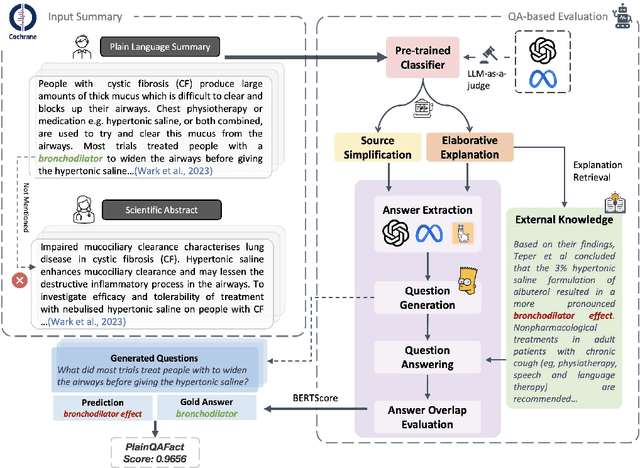
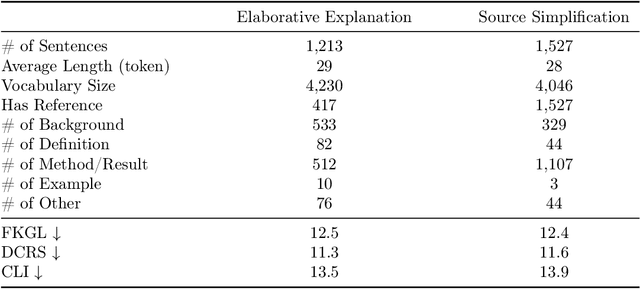
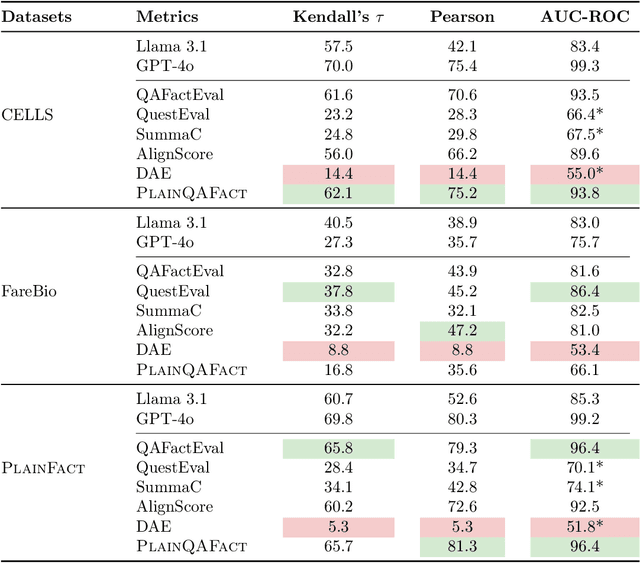
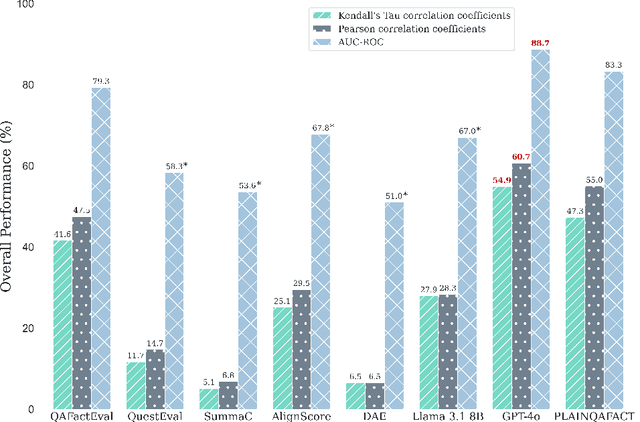
Abstract:Hallucinated outputs from language models pose risks in the medical domain, especially for lay audiences making health-related decisions. Existing factuality evaluation methods, such as entailment- and question-answering-based (QA), struggle with plain language summary (PLS) generation due to elaborative explanation phenomenon, which introduces external content (e.g., definitions, background, examples) absent from the source document to enhance comprehension. To address this, we introduce PlainQAFact, a framework trained on a fine-grained, human-annotated dataset PlainFact, to evaluate the factuality of both source-simplified and elaboratively explained sentences. PlainQAFact first classifies factuality type and then assesses factuality using a retrieval-augmented QA-based scoring method. Our approach is lightweight and computationally efficient. Empirical results show that existing factuality metrics fail to effectively evaluate factuality in PLS, especially for elaborative explanations, whereas PlainQAFact achieves state-of-the-art performance. We further analyze its effectiveness across external knowledge sources, answer extraction strategies, overlap measures, and document granularity levels, refining its overall factuality assessment.
NeuroPump: Simultaneous Geometric and Color Rectification for Underwater Images
Dec 20, 2024



Abstract:Underwater image restoration aims to remove geometric and color distortions due to water refraction, absorption and scattering. Previous studies focus on restoring either color or the geometry, but to our best knowledge, not both. However, in practice it may be cumbersome to address the two rectifications one-by-one. In this paper, we propose NeuroPump, a self-supervised method to simultaneously optimize and rectify underwater geometry and color as if water were pumped out. The key idea is to explicitly model refraction, absorption and scattering in Neural Radiance Field (NeRF) pipeline, such that it not only performs simultaneous geometric and color rectification, but also enables to synthesize novel views and optical effects by controlling the decoupled parameters. In addition, to address issue of lack of real paired ground truth images, we propose an underwater 360 benchmark dataset that has real paired (i.e., with and without water) images. Our method clearly outperforms other baselines both quantitatively and qualitatively.
Navigating Noisy Feedback: Enhancing Reinforcement Learning with Error-Prone Language Models
Oct 22, 2024Abstract:The correct specification of reward models is a well-known challenge in reinforcement learning. Hand-crafted reward functions often lead to inefficient or suboptimal policies and may not be aligned with user values. Reinforcement learning from human feedback is a successful technique that can mitigate such issues, however, the collection of human feedback can be laborious. Recent works have solicited feedback from pre-trained large language models rather than humans to reduce or eliminate human effort, however, these approaches yield poor performance in the presence of hallucination and other errors. This paper studies the advantages and limitations of reinforcement learning from large language model feedback and proposes a simple yet effective method for soliciting and applying feedback as a potential-based shaping function. We theoretically show that inconsistent rankings, which approximate ranking errors, lead to uninformative rewards with our approach. Our method empirically improves convergence speed and policy returns over commonly used baselines even with significant ranking errors, and eliminates the need for complex post-processing of reward functions.
 Add to Chrome
Add to Chrome Add to Firefox
Add to Firefox Add to Edge
Add to Edge